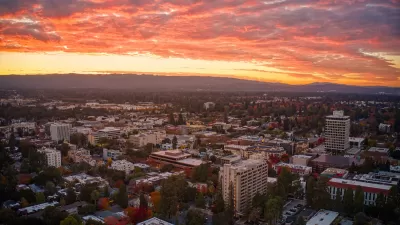Palo Alto’s planned community zoning has existed since 1951. As the real estate market in the Silicon Valley heats up, residents are questioning whether developers are abusing the density and height benefits they receive from the zoning code.
Palo Alto, home to Stanford University and located in the heart of the Silicon Valley tech boom, has temporarily suspended its planned community zoning—an incentive mechanism that allows developers to apply for additional height and density allowances in exchange for public benefits.
Jason Green reports that the city will suspend all projects, including one in the pipeline, that are seeking planned community zoning allowances, until the system can be studied in more detail.
Planning community zoning has been implemented to substantial effect since its inception: “More than 100 projects have been built with planned community zoning since 1951. It hasn't been substantively modified since 1978, when the city began requiring developers to provide public benefits.”
As for what reform might look like: “According to a city staff report, potential reforms could include establishing a minimum distance between a planned community zoning project and existing low-density residential neighborhoods, reserving the zoning for only certain types of projects and creating a fixed menu of public benefits.”
Planned community zoning has been under fire in Palo Alto since a political kerfluffle in November, “when 56 percent of 14,540 voters overturned the Palo Alto Housing Corporation's council-approved plans to build a 60-unit apartment complex for low-income seniors and 12 market-rate, single-family homes on 2.5 acres at 567-595 Maybell Ave,” according to an earlier report from Green.
FULL STORY: Palo Alto City Counicl agrees to 'timeout' for controversial zoning

Maui's Vacation Rental Debate Turns Ugly
Verbal attacks, misinformation campaigns and fistfights plague a high-stakes debate to convert thousands of vacation rentals into long-term housing.

Planetizen Federal Action Tracker
A weekly monitor of how Trump’s orders and actions are impacting planners and planning in America.

San Francisco Suspends Traffic Calming Amidst Record Deaths
Citing “a challenging fiscal landscape,” the city will cease the program on the heels of 42 traffic deaths, including 24 pedestrians.

Defunct Pittsburgh Power Plant to Become Residential Tower
A decommissioned steam heat plant will be redeveloped into almost 100 affordable housing units.

Trump Prompts Restructuring of Transportation Research Board in “Unprecedented Overreach”
The TRB has eliminated more than half of its committees including those focused on climate, equity, and cities.

Amtrak Rolls Out New Orleans to Alabama “Mardi Gras” Train
The new service will operate morning and evening departures between Mobile and New Orleans.
Urban Design for Planners 1: Software Tools
This six-course series explores essential urban design concepts using open source software and equips planners with the tools they need to participate fully in the urban design process.
Planning for Universal Design
Learn the tools for implementing Universal Design in planning regulations.
Heyer Gruel & Associates PA
JM Goldson LLC
Custer County Colorado
City of Camden Redevelopment Agency
City of Astoria
Transportation Research & Education Center (TREC) at Portland State University
Jefferson Parish Government
Camden Redevelopment Agency
City of Claremont





























